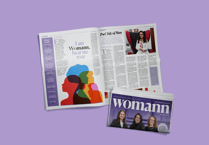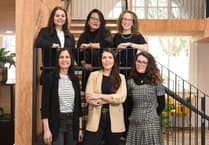‘The data is unequivocal. Women continue to face challenges in the workplace – and, as a result, are less likely to feel included at work.’
This stark conclusion comes from a powerful piece of research published by PwC, the global professional services firm, to coincide with International Women’s Day earlier this month. ‘Inclusion Matters’ drew on insights shared by women from around the world and explored what more can be done to propel women’s empowerment and advancement in the workplace.
According to a complementary study the ‘Women in Work Index 2024’ there is still a significant gender pay gap, especially in the UK. Women are still less likely than men to ask for promotion and the research found that men statistically experience higher workplace inclusion across the three dimensions of inclusion: belonging; fairness; and inclusive decision-making.
Janet Donnelly is Chief People Officer at PwC Isle of Man. Since joining the company last August a large part of her role has been looking at inclusion and diversity.
She says: ‘We have put a lot of focus on transforming the organisation: how we further develop inclusivity and diversity, how we continue to develop our employee proposition that attracts people, retains people and enables everyone to thrive in a collaborative and engaging environment where different ways of thinking and behaving are encouraged.
‘We’ve got quite a diverse workforce with people from all over the world coming to work with us. Our strategy aims to create a place where everybody can be their authentic self and enjoy their work life. To achieve this, we're focusing on integrating the different cultural aspects of our people into the workplace, so we maximise the benefits of such diversity in thought leadership and broad skills base with new and innovative ways of thinking and delivering.’
There is good reason for doing this: it is in the best interest of any company in today’s competitive employment market to be able to attract the best talent and give that talent the ideal environment in which to flourish. To this end it is vitally important we work to ensure women experience higher levels of workplace inclusion.
PwC Isle of Man has launched a new Inclusion and Diversity strategy which gender equity is a key pillar of. Their research has shown that ‘inclusion at work is a catalyst for women’s development and advancement, and positions them more strongly to respond to key workforce developments such as evolving leadership skills, flexibility in working patterns, changing employee expectations and AI reinvention.’
This is especially important for a firm like PwC, who employs people at all stages of their career. Women may experience contributing factors which impact how their career advances and develops such as motherhood or women’s health related issues.
According to Janet: ‘It’s re-educating ourselves about what inclusivity means in today’s world and what it means for developing our current workforce.
‘We’re going through a period of awareness by talking to our people and asking what works for them, and what they might be struggling with at different stages of their career.’
Janet, herself understands the struggle well: she managed to combine raising three daughters with completing a Master’s degree and a career in senior executive roles in the financial services industry around the world. Luckily, she says, she had ‘a very supportive husband’ because things were a lot tougher for women then. This gives Janet personal insight into the challenges that women face in pursuing their careers.
‘I think, going forward, I’d like to see an environment where women can balance family commitments and career goals and not feel guilty, through a supportive organisation that doesn’t expect you to work within a traditional working structure, but allows flexibility to accommodate the different aspects of life’s journey.’
PwC’s Inclusion Matters research lists four ways in which companies can create greater gender equity. One of these is ‘Focus on inclusion from day one, for everyone’ and another is ‘Make pay schemes fair’.
‘This is across all aspects of the workforce but particularly with gender: a sense of belonging, and fairness. Our policies, our opportunities, everything is built with fairness in mind and inclusivity in terms of decision making – these are key factors we need to be thinking about,’ says Janet.
Interestingly, one of the key elements of inclusivity is in decision making, people knowing that their opinions are valued.
And that feeling of inclusion feeds through positively into many areas: the PwC research discovered that women who experience higher levels of inclusion are more likely to have higher levels of job satisfaction and to feel job fulfilment. They are also more likely to seek out opportunities to learn and develop new skills.
The research concludes with the overall message that: ‘Inclusion at work is empowering and beneficial for all, but especially so for women. A workplace where women feel that they belong, are included in decision-making, and are treated fairly and equitably is a workplace where women can thrive.’
Empowering women ideally starts when they are young: PwC Isle of Man has just renewed its sponsorship of Love Tech, the Isle of Man charity which aims to raise awareness among school age children, especially girls, of all the opportunities that are available in STEM (Science, Technology, Engineering and Maths). Over the next two years, PwC's sponsorship will support Love Tech as they continue to develop their successful book initiative through the introduction of an enhanced STEM engagement programme, ‘STEM SPARK’, at all the island’s primary schools.




